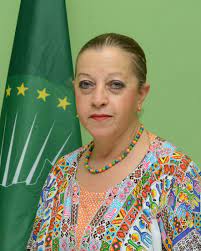On the occasion of the 2022 World Press Freedom Day (WPFD) celebrations, the African Commission on Human and Peoples’ Rights, through the Special Rapporteur on Freedom of Expression and Access to Information in Africa, Commissioner Ourveena Geereesha Topsy-Sonoo, reminded member States of the African Union (AU) of their obligations to protect journalists against attacks and ensure that “the same rights that people have offline should be protected online, in accordance with international human rights law and standards.”
In a statement issued by Commissioner Topsy-Sonoo, the African Commission reminded States Parties to the African Charter of their obligations to protect journalists from violence, threats of violence and various forms of harassment, as stated in Principle 20 of the Declaration of Principles on Freedom of Expression and Access to Information in Africa (the Declaration). The Special Rapporteur also reiterated the principle that “the same rights that people have offline should be protected online, in accordance with international human rights law and standards, thereby affirming that the provisions in Principle 20, on the safety of journalists and other media practitioners, equally apply to online threats against journalists.
Joining the international community to commemorate the World Press Freedom Day, celebrated annually on May 3, Commissioner Topsy-Sonoo also urged States Parties to take all measures to guarantee, respect and protect the right to freedom of expression and access to information through ensuring access to internet and social media services, including refraining from limiting and/or disrupting this access.
In her statement, she also emphasized that Principle 41 of the Declaration provides that “States shall not engage in or condone acts of indiscriminate and untargeted collection, storage, analysis or sharing of a person’s communications,” and further that “States shall only engage in targeted communication surveillance that is authorized by law, that conforms with international human rights law and standards, and that is premised on specific and reasonable suspicion that a serious crime has been or is being carried out or for any other legitimate aim.”
This year, World Press Freedom Day was commemorated under the theme “Journalism under Digital Siege,” highlighting emerging challenges on press freedom during the digital era, impacting journalism and freedom of expression alike.
The Special Rapporteur noted that: “Undoubtedly, the internet has emerged as an integral aspect of journalism. However, despite its numerous positive benefits, it is not without challenges. As lines increasingly blur between online and offline activities, attacks against journalists which were already occurring offline, are increasingly happening online as well.”
She pointed out that online violence has become a new frontline in journalism safety and is characterized by physical threats, sexual violence, online harassment and intimidation and verbal abuse.
She reiterated that while men journalists are also subject to abuse online, abuse directed against women journalists tends to be more severe with reports showing that women journalists are increasingly and persistently facing gender-based harassment and abuse online.
The phenomenon, she said, “can be defined as a combination of: often brutal, prolific online harassment and abuse, including targeted attacks that frequently involve threats of physical and/or sexual violence; digital privacy and security breaches that can expose identifying information and exacerbate offline safety threats facing women journalists and their sources; and coordinated disinformation campaigns leveraging misogyny and other forms of hate speech.”
The impact of these online attacks, she pointed out, can have a stifling impact on freedom of expression and press freedom, in addition to a direct impact on the safety and security of journalists.
Commissioner Topsy-Sonoo said in addition to these challenges, journalists and other media practitioners working in a number of African countries have been impacted by internet and social media shutdowns.
She stated that: “Disruptions and lack of access to the internet and social media violate the right to freedom of expression and access to information contrary to Article 9 of the African Charter on Human and Peoples’ Rights (the African Charter) and can have serious consequences for press freedom, leaving journalists struggling to do their job effectively.”
The Special Rapporteur also called attention to and the need to address another cause for concern, which is the exponential rise of surveillance throughout the continent.
She cited the multiple reports of States deploying surveillance technologies in their jurisdiction and noted the steady rise in facial recognition tools that track and identify individuals unbeknown to them. Furthermore, she pointed out that a number of States have installed facial recognition-enabled surveillance cameras, that they claim to utilize for crime prevention but which are reportedly being utilized to keep track of, and remotely hack journalists and critiques of the State. These surveillance technologies, she said, access and process data without the consent of subjects and contravene the right to privacy.
She therefore called on States Parties to the African Charter to use this occasion to reaffirm their commitment to the importance of press freedom, in addition to acknowledging the key role played by the media in ensuring full respect for the right to freedom of expression, promoting the free flow of information and ideas, assisting individuals in making informed decisions and facilitating and strengthening democracy.







